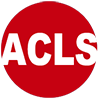Raven EMS Education Program ManualRAV-260 Advanced Life Support (Red Cross ALS) Course
 | This course provides physicians, nurses, paramedics and other health care providers with information concerning advanced management of the cardiac arrest patient (NC Community Colleges, 2024). |
Course Description
The Advanced Life Support (ALS, sometimes referred as acls) class from the American Red Cross has been designed specifically for healthcare providers and first responders – and offers ways to help streamline your training, improve your skill retention and help you better serve your patients. By building on your Basic Life Support (BLS) knowledge, our scientifically equivalent and educationally superior training emphasizes providing high-quality patient care by integrating rhythm interpretation, electrical interventions, and pharmacologic knowledge with critical thinking, problem-solving, and in-person psychomotor skills practice to achieve the best possible patient outcomes. Throughout the Red Cross ALS course, you’ll learn advanced life support assessment, as well as how to best manage respiratory emergencies, and Advanced Cardiac Life Support (ACLS) protocols for acute arrhythmias, cardiac arrest (including post-cardiac arrest care), acute coronary syndromes and acute stroke within or outside of a medical facility setting. Advanced Life Support courses are designed for professional healthcare providers who participate in the assessment and management of critical patients, including those working in in-hospital, pre-hospital, and out-of-hospital medical facilities. The only prerequisite for enrollment is that you must be proficient in adult basic life support (BLS) skills (ARC, 2024).
Prerequisites
Course Options
- In Person: The American Red Cross Advanced Life Support (ALS) Instructor-Led Training course provides participants with the knowledge and skills they need to assess, recognize and care for patients who are experiencing a cardiovascular, cerebrovascular or respiratory emergency. When a patient experiences a life-threatening emergency, healthcare providers need to act swiftly and promptly. The course emphasizes providing high-quality patient care by integrating psychomotor skills, rhythm interpretation, electrical interventions and pharmacologic knowledge with critical thinking and problem solving to achieve the best possible patient outcomes.
- Course length: Ten (10) hours (ARC, 2019)
- Student to instructor ratio: Maximum of six (6) students per instructor
- Passing score: Minimum of 84% is required on the final exam
- In Person Review (ARC, 2019): The purpose of the Advanced Life Support Review course is to give participants the opportunity to review the course content within a formal class setting. The format optimizes a participant’s ability to successfully complete the knowledge and skill evaluation. The responsibility for preparing for the testing scenarios and the final exam is shared by the instructor and the participant. To be eligible to participate in the Review course, the participant must possess a current American Red Cross Advanced Life Support certificate (or equivalent), or an American Red Cross Advanced Life Support certificate expired by no more than 30 days. Those without a certificate may not participate in the Review course option. They can only participate in a full course (an Advanced Life Support Instructor-Led Training course or an Advanced Life Support Blended Learning course) or an Advanced Life Support Challenge course.
- Course length: Five (5) hours
- In Person Challenge (ARC, 2019): The purpose of the Advanced Life Support Challenge course is to give participants the opportunity to demonstrate knowledge and skill competency outside a formal class setting. Preparing for the testing scenarios and final exam is the responsibility of the participant. The Challenge course option is available to all individuals with a current Advanced Life Support certificate and those who do not hold a certificate.
- Course length: No minimum length
- Blended Learning: The American Red Cross ACLS Blended Learning Course combines online training coursework with an in-person skills session – so you can take them when and where you like – and on the device that suits you best. Throughout the course, our interactive scenarios will help you understand the science behind ALS and the finer points of providing care, and improve your clinical decision-making skills. With the online class complete, and after passing your final written exam, you’ll attend an in-person skills session – where you’ll meet with a certified ALS/ACLS Red Cross instructor and demonstrate your ALS skills. After passing both sections of the course, you’ll receive a two-year ALS certificate. As part of the Blended Learning experience, our ALS class features adaptive learning technology. By using this groundbreaking technology, you’ll not only follow a personalized learning path, but you’ll have the option to test out of sessions if you demonstrate competency. It’s an innovative way to reduce your overall class time and help you earn your ALS certification (sometimes referred as acls certification) faster.
- Online course length: Four (4) to seven (7) hours (ARC, 2019)
- In-person course length: Three (3) hours
- Student to instructor ratio: Maximum of six (6) students per instructor
Course Topics
Change Log (7.19.916.C260)
| Date | Author | Description of Change | Citations |
|---|
| 2025-01-11 | Becker, T.Theron Jack Becker | Moved this course to its own page from x.xx.916. | |



